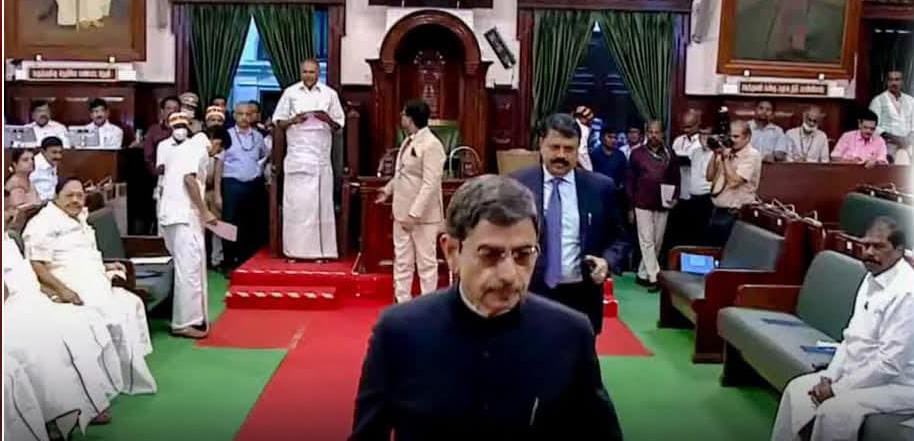Published Jan 06, 2025 | 1:11 PM ⚊ Updated Jan 06, 2025 | 2:34 PM

Ravi walks out of the assembly
The tussle between government and governor in Tamil Nadu continues to make the headlines. Tamil Nadu Governor RN Ravi walked out of the state Assembly on Monday, 6 January, moments before delivering his customary annual address, in a repeat of his actions from last year.
The Governor kicked up a row over the assembly playing Tamil Thai Vazhthu, the state anthem, and not the National Anthem during the session’s opening proceedings. Governor’s office deemed it an insult to the National Anthem and the Constitution.
In a statement that was later released, Raj Bhavan claimed that the Governor had “fervently appealed” to Chief Minister MK Stalin and Speaker M Appavu to include the anthem, citing constitutional propriety.
The statement claimed that despite his appeal, the session proceeded without the National Anthem, which Governor Ravi perceived as a breach of constitutional norms. Expressing his disapproval, the Governor left the assembly within minutes in protest.
However, the ruling alliance in the state pointed out that, traditionally, the national anthem is played during the final act of the session.
The Tamil version of his prepared speech was later read out by the Speaker.
Meanwhile, Water Resources Minister Duraimurugan, proposed a resolution in the Assembly on Monday to record only the printed portions of the Governor’s address in the official proceedings.
The assembly session concluded with the singing of the national anthem, as conventional practice.
The incident has triggered a political storm across party lines. The Governor’s office issued a statement condemning the omission, calling it an affront to constitutional values.
“Respecting the National Anthem is among the fundamental duties enshrined in our Constitution,” the statement said. “Today, only the Tamil Thai Vazhthu was sung. The Governor respectfully reminded the House of its constitutional duty, but the Chief Minister and the Speaker refused.”
The Constitution of Bharat and the National Anthem were once again insulted in the Tamil Nadu Assembly today. Respecting the National Anthem is among the first Fundamental Duty as enshrined in our Constitution. It is sung in all the state legislatures at the beginning and the end…
— RAJ BHAVAN, TAMIL NADU (@rajbhavan_tn) January 6, 2025
The Tamil Nadu government defended its actions, stating that assembly proceedings adhered to established protocols. Members of the ruling DMK party dismissed the Governor’s actions as an overreaction.
Chief Minister MK Stalin criticised the Governor, stating, “As per the Constitution, delivering the Governor’s address at the beginning of the year is a tradition of legislative democracy. Ignoring this duty and leaving the Assembly is nothing short of childish behavior.”
He further remarked, “The Governor’s repeated actions of disrespecting the people of Tamil Nadu, their elected government, and the century-old Tamil Nadu Legislative Assembly are unbecoming of his office. The question on everyone’s mind is, ‘Why should someone unwilling to fulfill their constitutional duties remain in that position?”
Similarly, Congress MP Manickam Tagore labelled the Governor’s walkout politically motivated.
“Our National Anthem is always sung as the final act in Tamil Nadu’s Assembly, as per established protocol. The Governor’s actions today reek of political drama, showing how yet another institution is being misused by the RSS—a group that didn’t hoist the flag for 51 years but now weaponises patriotism,” Tagore posted. “The Hon’ble Rashtrapati Bhavan must recall this Governor immediately.”
Completely ridiculous!
Our National Anthem is always sung as the final act in Tamil Nadu’s Assembly, as per established protocol. The Governor’s actions today reek of political drama, showing how yet another institution is being misused by the RSS. A group that didn’t hoist 1/2 https://t.co/hINzLqK6ok— Manickam Tagore .B🇮🇳மாணிக்கம் தாகூர்.ப (@manickamtagore) January 6, 2025
AIADMK leader Edappadi K Palaniswami (EPS) seized the opportunity to criticise the DMK government, accusing it of manipulating the Governor’s speech to further its political agenda.
“The DMK has not only ignored the Governor but has systematically sidelined him, undermining constitutional protocols,” Palaniswami said during a press briefing. He alleged that the ruling party prioritised self-promotion over governance and brought disrepute to the state assembly.
Pattali Makkal Katchi (PMK) leader Dr Anbumani Ramadoss has called on Tamil Nadu Governor Ravi to respect the state’s traditions and the sentiments of its people while emphasising the need to prioritise pressing issues affecting the state.
Dr Anbumani stressed the importance of mutual respect between the Governor and the state government.
Governor Ravi’s tenure in Tamil Nadu has been marked by repeated controversies and clashes with the DMK-led state government, since his appointment in September 2021.
The former IPS officer, who previously served as Governor of Nagaland, brought with him a reputation for being a polarising figure. In Nagaland, Ravi faced criticism from both political groups and civil society for alleged interference in governance, culminating in boycotts during his farewell.
Upon his arrival in Tamil Nadu, Ravi vowed to maintain a “clean slate” in relations with the state government. However, tensions soon emerged.
Between September 2021 and May 2022, Ravi withheld assent to 21 bills passed by the Tamil Nadu Assembly, including the contentious anti-NEET bill, which aimed to eliminate the national medical entrance exam in favour of Class 12-based admissions.
Ravi has frequently criticised the DMK government on issues ranging from NEET-linked suicides to social justice failures, including low conviction rates in cases of caste-based crimes.
His comments on the Dravidian model of governance as “expired” and “linguistically apartheid” further escalated hostilities. Moreover, his support for contentious policies like the National Education Policy (NEP) and suggestions to rename Tamil Nadu as “Tamizhagam” have been perceived as encroachments on state identity and governance.
The Governor’s actions, including previous walkouts from Assembly sessions, unilateral dismissal of a minister, and alleged protocol breaches, have led to calls from the DMK and its allies for his recall.
(Edited by Dese Gowda with inputs from K Nitika Shivani)

